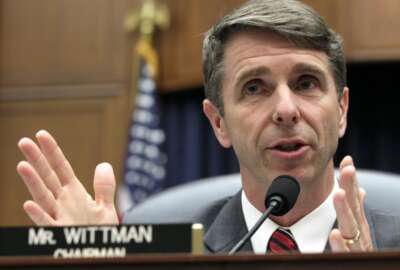To listen to the Federal Newscast on your phone or mobile device, subscribe on PodcastOne or Apple Podcasts. The best listening experience on desktop can be found using Chrome, Firefox or Safari.
- Three years after OPM’s data breach, House lawmakers said the agency still hasn’t done much to modernize its IT. Members of the House Oversight and Government Reform Committee asked Jeff Pon, the new director of OPM, to brief the committee on what it’s doing to prevent another data breach after several IG reports found cybersecurity gaps. The request comes after a number of inspector general reports found gaps in the agency’s cybersecurity strategy. Lawmakers asked Pon to send them an updated copy of the agency’s IT Modernization Expenditure Plan before April 3. (House Oversight and Government Reform Committee)
- A sudden departure of one federal agency CIO. Johnson Joy, the Department of Housing and Urban Development’s chief information officer, unexpectedly resigned yesterday. A HUD spokesman confirmed Secretary Ben Carson accepted Joy’s resignation Tuesday morning. The spokesman said Chad Cowan, the chief of staff to the Deputy Secretary, will temporarily serve as the acting CIO. Joy’s last day was yesterday. The Guardian first reported Joy’s resignation, saying it comes after allegations of corruption surfaced around a contract for professional and staffing services. Joy joined HUD in June after spending his career in the private sector. (Federal News Radio)
- The Office of Management and Budget unveiled the details of the president’s management agenda. It included 14 cross-agency priority goals including IT modernization, data accountability and transparency, and a 21st century federal workforce. But OMB said all of the goals intersect and inform one another. The Trump administration said it wants work with Congress to change the regulatory and statutory rules that created an “incomprehensible” civil service system. It also wants to help consolidate the current five federal pay providers, into to one. (Federal News Radio)
- Veterans service organizations and VA congressional leadership are hopeful the 2019 omnibus contains three major veterans policies. House VA Committee Chairman Phil Roe (R-Tenn.) said he and Senate VA Committee leadership came to an agreement on proposals to consolidate community care programs, update the infrastructure review process and extend caregiver benefits. The current continuing resolution expires Friday. (Federal News Radio)
- The House reinstated the Holman Rule for another year. It allows members to change a federal employee’s salary, or cut the number of employees who work within a particular agency, through the amendment process. The amendment process gives members little time for debate and no time for an agency to justify or appeal a recommendation. The House included the Holman Rule in its rules package last year. It must reinstate the rule every year. House Republicans slipped the provision into floor rules for debating two unrelated pieces of legislation. (Federal News Radio)
- The military’s career intermission pilot program may become permanent if Representative Jim Banks (R-Ind.) has his way. He’s introducing a bill to codify the pilot program into law. The program would allow service members to take a break from the military to go to school or care for a loved one.
- A Pentagon audit found major problems with improper payments to DoD behavioral health providers. At the request of the Defense Health Agency, the inspector general looked at claims for the treatment of Autism Spectrum Disorder, and found that more than two-thirds of the payments made through the TRICARE health system were improper. Those estimated improper payments in the TRICARE North region totaled more than $82 million in 2015 and 2016. Auditors said the problems included missing documentation, providers billing for more services than they actually delivered and payments for services that aren’t covered by the health plan. (Department of Defense Office of Inspector General)
- A new House bill could prompt federal agencies to do what they’re supposed to do in the first place. It’s the Accelerated Payments for Small Business Act, introduced by Representatives Steve Knight(R-Calif.) and Adriano Espaillat (D-N.Y.). The bill would establish a governmentwide goal of paying small contractors within 15 days after they submit invoices. The same goal would apply to subs. This comes after the Office of Management and Budget did not renew a policy of fast payment to subcontractors. (Rep. Steven Knight)
Copyright
© 2024 Federal News Network. All rights reserved. This website is not intended for users located within the European Economic Area.

